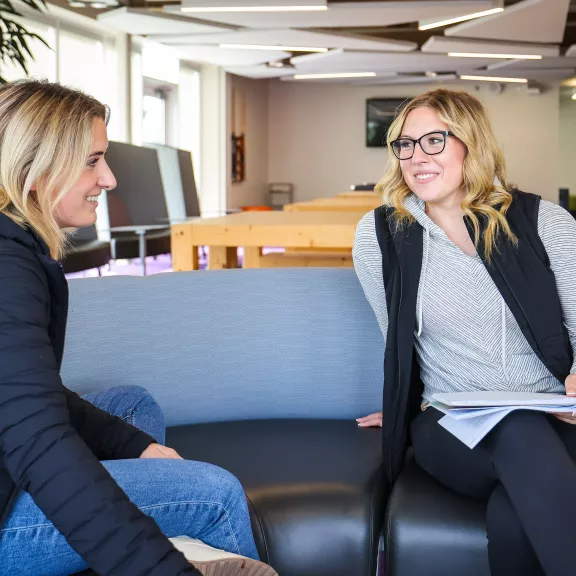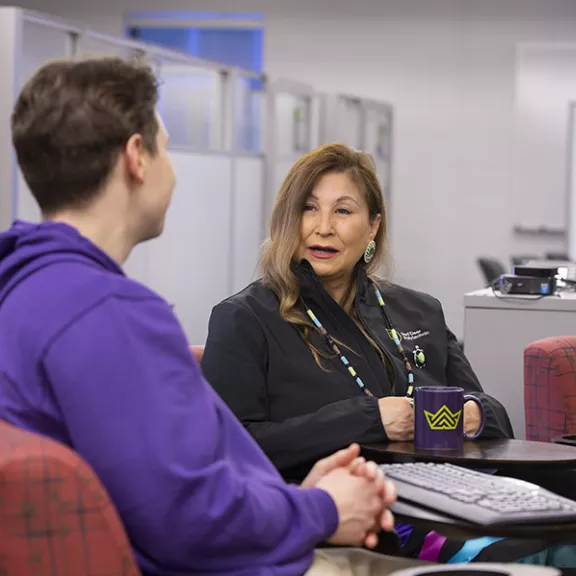
Social Work Diploma
About the Social Work Diploma
The mission of the Social Work Diploma Program at RDP is to graduate ethical and compassionate social workers committed to anti-oppressive practice and social justice.
The focus of social work is on the interactions between people and their social environment. The program examines how to help people meet the demands of daily life by helping to increase their access to resources, services and opportunities as individuals or within their communities. In this program, you will learn to identify gaps and challenges in those systems and ways in which they can be addressed.
This diploma program can be completed on a full or part-time basis.
NEW: In Fall 2024, we are also introducing an online cohort in addition to the on-campus cohort that will include the same courses and the same time commitment.
In both cohorts, students will have scheduled times for classes. Application requirements and the application process are the same for each stream. Program planning will take place with students during the registration process.
Please note: Field placements are not generally online for either cohort and will occur in an appropriate program-related setting.
All first-year students (both online & on-campus) will be required to be on-campus in Red Deer in late August for approximately 1 week to begin SOWK 214 and participate in orientation activities.
Work-integrated Learning
In both years of the Social Work Diploma program, you will have opportunities to participate in field work experiences. These hands-on learning experiences will help you turn theory into practice, preparing you for a rewarding career in social work.
Increasingly, social work practice in many social services agencies requires workers to work extended hours of operation. Many agencies now provide a variety of programs associated with their services that operate on evenings or weekends. Students need to be prepared to work during non-traditional business hours if placed in these agencies.
Further Study
The RDP Social Work Diploma can be transferred to a Bachelor of Social Work (BSW) degree with the University of Calgary or Mount Royal University. Students can also continue their education at RDP by transferring into the Bachelor of Arts in Multidisciplinary Studies. To learn more contact the Student Connect Centre.
While students may enter the Social Work Diploma program without English 30 or ELA 30-1, those intending to transfer to a university program are advised to complete English 30 or ELA 30-1 before entering the program. This will enable you to take university transferable English courses in your first year. Students who enter the program without English 30 or ELA 30-1 may take English 30 (or equivalent) upon admission to Social Work but may not complete the Diploma within four terms. English 30 or ELA 30-1 is not credited toward Diploma requirements.

Related Careers
Social Worker
Upon completion of the Social Work Diploma Program, graduates are eligible to apply for registration with the Alberta College of Social Workers.

Meet the Faculty
At Red Deer Polytechnic we are proud of our faculty members and staff who are experts in their disciplines and subject areas.
Intakes
Fall (Domestic) - Start Date: Sep 04, 2024
- Application window:
-
- Registration start date:
- Fee payment deadline:
- First day of classes:
Fall (International) - Start Date: Sep 04, 2024
- Application window:
-
- Registration start date:
- Fee payment deadline:
- First day of classes:
NOTES:
- International students have to pay their tuition deposit to receive their letters of acceptance
- Important dates may change
Admission Requirements
Admission requirements for specific programs will often refer to Alberta Grade 12 course groups. Visit the Admission Requirements page for detailed group descriptions.
International Students: If you are an international student or have completed your high school education outside of Alberta, please refer to our International Course Equivalencies page for information on how your coursework may align with our admission requirements.
Eligibility for admission to the Social Work Diploma program at Red Deer Polytechnic requires applicants to meet minimum academic requirements. Qualified applicants who meet all minimum requirements will be offered admission on a first-come, first-served basis.
Academic Requirements
Students applying to Social Work must have a minimum of 50% in:
ELA 30-1 (or ENGL 095 or equivalent) or
ELA 30-2 (or ENGL 090 or equivalent)
AND
Social Studies 30-1 (or SOST 095 or equivalent) or
Social Studies 30-2 (or equivalent) or
Aboriginal Studies 30 (or equivalent)
OR
Completion of College Board Placement (Accuplacer) testing with a minimum score of 250 on the Reading component, 250 on the Writing component and 5 on the WritePlacer Test.
Once it has been determined that you have met the academic requirements above, you will be given access to a package of materials through your account on The Loop, under the Applications tab. This package will help you complete the following additional non-academic academic requirements:
Additional Academic Requirements
Personal Essay
The package of materials you receive will include guidelines for writing a personal essay.
Volunteer/Work Hours
A minimum of 100 hours of volunteer experience is required as part of the Social Work Application Process. Three months of full-time work-related experience can also be used in lieu of volunteer experience. The hours must be current (completed within the last 18 months), and completed at one organization, as one confidential reference is required from the direct volunteer or employment supervisor.
It is required that these be completed in a
- human service agency/organization, or
- social service agency/organization, or in a
- healthcare environment.
The clients must be disadvantaged or marginalized in some way.
The volunteering must include direct client or patient contact as your primary function (rather than office work, cooking, etc.) and deal with the client’s psycho-social well-being.
If you have any questions about the suitability of your volunteer experience, please complete the self-assessment guide.
Opportunities can often be found in:
- helping agencies
- outreach organizations
- hospitals and long-term care facilities
- programs/camps for at-risk youth
- women’s shelters
- agencies for people with addictions, homelessness, mental illness
- agencies for people who are developmentally challenged
We do not accept hours completed in:
- high school work experience programs
- fundraising
- sports coaching
- daycare (exception is a daycare in a women's shelter)
- babysitting
- thrift stores/warehouse
- personal self-help organizations
- cooking (exception is soup kitchen or hospice)
- foodbank / meals-on-wheels
- educational aide (exception is for children who are coded)
- before school/after school programs/lunch supervision (exception is for children who are coded)
- housekeeping
- personal experience such as having a sibling with autism or having foster children in the home;
- office/administrative work
- bible or church group and activities.
Confidential References
One of your references must be from your volunteer/work supervisor once you are near to completing the required hours.
The other two should be from professionals who know you, such as teachers, additional supervisors, social workers, doctors, lawyers etc. They cannot be provided by family members or close friends/family friends.
After it has been determined that you meet the academic requirements, you will be given access to a Reference Form and instructions on how to submit it.
Interview
An interview with a Social Work faculty member is required as part of admission to the Program. The purpose is to discuss your preparation for studies and interest in the profession. Your work or volunteer experience must be completed or almost completed prior to your interview with a Social Work faculty member.
Interviews will begin in the spring and will continue until the program is full and a waitlist is established – submitting your package earlier rather than later is to your benefit. Interviews will begin to be booked in February.
Additional Non-Academic Requirements
Practicum Requirements
While not an admission requirement for the program, applicants are advised that they will be required to provide a Police Information Check or Vulnerable Sector Check to most agencies where they will be placed for practicum experiences. The existence of a criminal record may prevent practicum placement, program completion, and/or professional licensure and therefore affect future employment prospects.
Note: Depending on the placement you may also be required to provide a Child Intervention Record Check.
It is the decision of each agency or institution to accept or reject a student for placement or observation experience based on the results of the criminal record check. Students should be prepared for approximately $50 to $75 in extra expenses to acquire these documents.
Both years of the program include field placement courses. These will occur in a workplace setting related to the field of practice, allowing students to integrate classroom knowledge into practice throughout the program. Program faculty will strive to consider preferred locations and preferences when assigning field placements for field placement courses; however, due to field placement availability, students may be required to travel to locations outside of their preferences.
English Language Proficiency
Applicants who declare English as a first language are exempt from ELP requirements. Applicants whose first language is not English must demonstrate English Language Proficiency (ELP) for admission to credit programs by providing official documentation to the Office of the Registrar at international.admissions@rdpolytech.ca or by regular mail, after an online application has been submitted. All ELP tests must have been obtained within two years of the date their program starts. ELP requirements are in addition to the other admission requirements noted above.
Study Permits
Students with Study Permits that are admitted to a program that has a practicum or clinical placement in childcare, primary/secondary school teaching or health service field occupations must complete their Medical Authorization as required by Citizenship and Immigration Canada one month prior to the start of classes.
Prior Learning and Transfer
Students presenting courses from other recognized post-secondary institutions may be granted transfer credit towards the Social Work Diploma, visit our Recognition of Prior Learning and Transfer Credit page to learn more.
Program Cost
These costs are an estimate of tuition and fees based on the recommended course load per year.
NOTE: Additional fees apply. View here for a detailed, estimated breakdown of tuition, non-instructional mandatory fees, health and dental plan costs, and estimated textbooks and supplies costs.
These costs are an estimate of tuition and fees based on the recommended course load per year.
NOTE: Additional fees apply. View here for a detailed, estimated breakdown of tuition, non-instructional mandatory fees, health and dental plan costs, and estimated textbooks and supplies costs.
Financial Aid Options
Student life can be very expensive, and few individuals have enough money to pay up-front for their post-secondary education.
Program Content
All students in this program will take most of the same courses. You will select two electives each year and participate in work-integrated learning opportunities in both years.
Program Courses
Graduation Requirements
You must pass all course requirements and achieve a minimum cumulative GPA of 2.00.
Continuing and Professional Education
Further your career by advancing your existing skills through flexible courses, micro-credentials and programs.